

*Notes and references for this article.
The Master Manipulator: Controlling your feelings
By the turn of the 20th Century, therapists were using hypnotic techniques to probe the unconscious. The advantage over dreams was that the "dreamer" could converse with the hypnotist and describe feelings and details to explain the symbology and drama. One pioneer in this area was young Jewish neurologist, Dr. Sigmund Freud, with a practice in Vienna.
Having treated many mentally troubled individuals, Freud made observations about how personality was formed and what was the driving force behind our behavior. He cleverly appealed to the public's fascination with dreams by publishing his theories in a book titled The Interpretation of Dreams, followed by Psychopathology of Everyday Life. The books were widely read in Europe, among the intellectuals, but failed to reach the American readers because they were not in English.
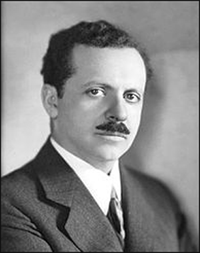 Freud had a nephew living in New York named Edward Bernays. To congratulate his uncle, Bernays sent him an expensive box of cigars. Freud responded by sending him copies of his books, which Bernays eagerly read.
Freud had a nephew living in New York named Edward Bernays. To congratulate his uncle, Bernays sent him an expensive box of cigars. Freud responded by sending him copies of his books, which Bernays eagerly read.
Bernays witnessed the irrational behavior of WWI, noting with interest how political leaders could easily motivate large groups of people to do irrational things (i.e. kill each other). Inspired by Freud's books, he wondered if groups of people could be motivated in peaceful times -- for profit.
The secret, which Bernays discovered, was to manipulate the unconscious. He studied the propaganda techniques used by the war department and decided to call his technique, "Public Relations", thereby coining that phrase. His motto was information drives behavior.
So effective were Bernays' techniques that they would be used to change the way consumers are treated, molding our desires to conform with new products and tapping into our vital drives and basic identities to create irrational desires. It's potent stuff. It challenges our concept of free will and, in doing so, undermines the nature of democracy.
|
Bernays: The Early Years
There are many great stories about Edward Bernays in his early years. His ability to understand the motivation of people was renown. He invented the idea of "free advertising" by appealing to the needs and motives of newspaper and magazine editors, giving them pre-written promotional packages that could be customized for each publication. He invented the idea of "target marketing" and "celebrity endorsements". But few examples showing his use of psychoanalytic theory to make people do irrational things can surpass these two success stories:
In the new age of convenience, the Betty Crocker company was surprised that their new invention -- instant cake mix -- was not selling well. Customers had asked for the product, but they were avoiding it. This was a job for Bernays. Instead of massive surveys of potential buyers, Bernays had associates in various regions of the country invite housewives to an informal get-together (focus group). They were given coffee or snacks and encouraged to talk freely. When the subject of instant cakes was discussed, Bernays team learned that the housewives felt guilty and believed that the convenience -- just adding water to the powder -- was somehow short-changing their family. It didn't feel right. Understanding the motivational problem was the first step and Bernays had the solution: remove the powdered egg and emphasize on the box "Just add your own eggs!" This simple act was all it took. Women unconsciously and symbolically were now giving one of their own ovum to nourish their family. It was basic unconscious stuff. Of course, it didn't make any sense rationally; it was less convenient to add the egg. But it felt good and it sold cake mix. Torches of Freedom By the mid-1920s smoking had become commonplace in the United States. At the same time women had just won the right to vote, widows were succeeding their husbands as governors of such states as Texas and Wyoming, and more women were attending college and entering the workforce. But while women seemed to be making great strides in certain areas, socially they still were not able to achieve the same equality as their male counterparts. Women were only permitted to smoke in the privacy of their own homes. Public opinion and certain legislation at the time did not permit women to smoke in public. In 1922 a woman from New York City was arrested for lighting a cigarette on the street. George Washington Hill, president of the American Tobacco Company and an eccentric businessman, recognized that an important part of his market was not being tapped into. Hill believed that cigarette sales would soar if he could entice more women to smoke in public.
Bernays paid a group of attractive debutantes to participate in NY City's Easter parade. They were masquerading as supporters for women's rights. On cue, they took out their Lucky Strike cigarettes and lit them up in front of waiting reporters and photographers who had been tipped off. The parade event caused a national stir and stories appeared in newspapers throughout the country. This was another example of Bernays "free advertising". [Right:] Mrs. Taylor-Scott Hardin parades down New York's Fifth Avenue with her husband while smoking "torches of freedom,"a gesture of protest for absolute equality with men. Of course, Lucky Strike could never admit that their cigarette was a penis -- especially to the women, so they called them "torches of freedom" and linked with the women's political movement, the Statue of Liberty's torch, and the concept of freedom in general. If you supported one cause, you supported the other. Cigarettes equalled support for women's equality. This same campaign was later used decades later to promote Virginia Slims to feminists. Both marketing strategies were highly successful.
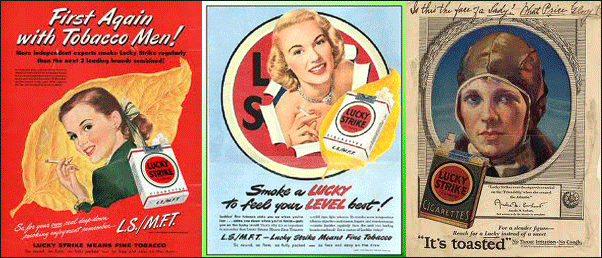 Bernays made women want to do something unhealthy. It was totally irrational but when you are dealing with the unconscious aspects of personality, feelings always trump intellect.
|
You're Not a Citizen -- You're a Consumer!
Before Bernays and his psychoanalytic approach to marketing, manufacturers would talk about the utility and value of their products. They assumed the customer already needed a specific food, tool or appliance and just wanted the best price. But after a while, that approach was losing sales.
After years of being saturated by new, better and cheaper products, consumers were satiated and sales began to drop. The items in demand were those that were somehow different -- not like all the other mass produced stuff. Bernays recognized that people wanted to express themselves and their uniqueness in their purchases, and he learned to pander to these desires.
Manufacturing could only make better and cheaper products if they could be mass produce as identical items on an assembly line. There was little variety available with this method. This was especially evident in the automotive industry, where the sales of new cars had been steadily declining. Bernays approached the problem in a brilliant way -- "branding".
Through endorsements by celebrities and business leaders, Bernays made the General Motors (GM) brand synonymous with the highest manufacturing standards and quality in America. Rather than promote a particular model, he promoted the company itself in such a way that he linked the feeling of American pride and patriotism with the GM brand.

At the 1939 World's Fair in NY, Bernays had GM build a huge model of a futuristic city, with superhighways and overpasses -- symbols of how GM would contribute to a bright future for the nation. Again, it worked because he had found a way to link the product with a feeling -- a feeling that would drive people to buy a particular brand.
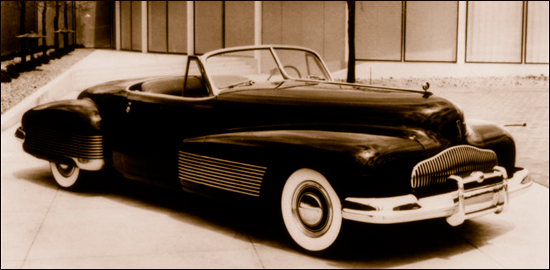
 When auto makers needed to sell to younger consumers, specifically young men, Bernays used their libido as a motivator. It was the same basic, unconscious stuff... males competing for the best mates. He linked the brand and style of the automobile with the personality of the consumer. For the first time, thanks to Bernays, you could express your identity through your car. It was totally irrational, but it worked.
When auto makers needed to sell to younger consumers, specifically young men, Bernays used their libido as a motivator. It was the same basic, unconscious stuff... males competing for the best mates. He linked the brand and style of the automobile with the personality of the consumer. For the first time, thanks to Bernays, you could express your identity through your car. It was totally irrational, but it worked.
"You don't need it, but you will feel better with it."
Edward Bernays' biggest impact on the world was still yet to come. Back in Austria, uncle Freud was down and out and in serious debt. He desperately called upon Bernays for help. Not far from Freud, Nazi Propaganda Minister, Joseph Goebbels, had noticed Bernays work and was prepared to take the concept to the max. That's next... on viewzone.
© Gary Vey for viewzone

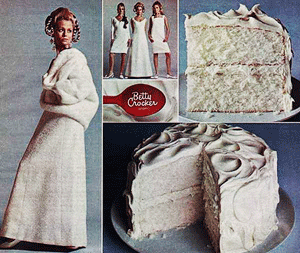 Betty Crocker's Instant Cake Mix
Betty Crocker's Instant Cake Mix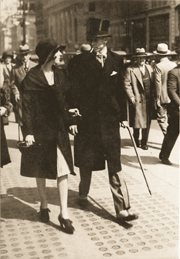 In 1928, Hill hired Bernays to expand the sales of his Lucky Strike cigarettes. Recognizing that women were still riding high on the suffrage movement, Bernays used this as the basis for his new campaign. He consulted Dr. A.A. Brill, a psychoanalyst, to find the psychological basis for womens smoking. Dr. Brill determined that cigarettes, which were usually equated with men, represented the penis that women didn't have, but wanted (penis envy). The cigarette would give them a symbolic penis and with that penis they could be powerful like men.
In 1928, Hill hired Bernays to expand the sales of his Lucky Strike cigarettes. Recognizing that women were still riding high on the suffrage movement, Bernays used this as the basis for his new campaign. He consulted Dr. A.A. Brill, a psychoanalyst, to find the psychological basis for womens smoking. Dr. Brill determined that cigarettes, which were usually equated with men, represented the penis that women didn't have, but wanted (penis envy). The cigarette would give them a symbolic penis and with that penis they could be powerful like men.